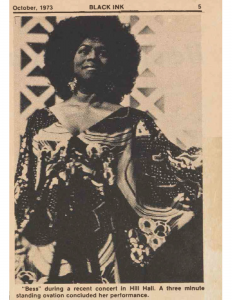by Professors Marc Callahan, David Garcia, and LaToya Lain
Women descending from their ancient mirror
Bring you their youth and their faith in yours
And one, her light the veil that draws you in
Makes you secretly see the world without you.-Paul Éluard
Upon listening to Martha Flower’s 1973 performance of Francis Poulenc’s Miroirs brûlants, recently uncovered in the UNC-Chapel Hill Department of Music archive collection, one can only imagine that this very text by Éluard was describing the performer herself. From the moment the illustrious soprano spins a perfectly crafted chiaroscuro tone on the opening text Tu vois le feu du soir, the listener hears what Maya Angelou once described as a voice like “hot silver melted.” All at once, the singing embodies an icy metal like that of mercurized glass yet containing molten passion, glowing from its confines. As the ethereal sound washes over the listener, everything seems to disappear. They find themselves alone—transported—mesmerized by the youthful voice of Ms. Flowers from a half century ago.
Seldom does a singer possess the restrained passion and musical intelligence required to perform a song the likes of Poulenc’s mélodie but, in this regard, Martha Flowers’s portrayal of the symbolist art song is exquisite. What an incredible gift that UNC-Chapel Hill was fortunate enough to have the likes of Martha Flowers on their music faculty in the mid-1970s. But her significance to the Department of Music extended across campus. As the first Black faculty in the department, Flowers was a part of the generation of Black Americans to desegregate the University of North Carolina at Chapel Hill. Indeed, following Brown v. Board of Education of Topeka (1954), Black students, faculty, and staff fought to help realize the promise of a university of the people, and it is this history (told in part by The Carolina Story: A Virtual Museum of University History) to which this issue of DWW contributes.

Martha Flowers joined the faculty in the Department of Music in 1973. She taught courses in voice, diction, and Afro-American music as well as putting on faculty recitals in Hill Hall Auditorium (now Moeser Auditorium). And she inspired her students, especially Black music students. In 1973 Sadie Copland, staff writer for UNC Black Student Movement’s Black Ink, wrote a feature on Flowers titled “UNC Welcomes Singer” in which she described Flowers’s role as Bess in the famous 1955–1956 production of Porgy and Bess. She also explained the reason why Flowers decided to come to Carolina, saying “Since there were no Black music instructors here, but there were Black students in the music program, she decided UNC was where she could best fulfill this need” (5).
In another Black Ink article titled “Seniors Talk about Years at UNC,” Mae Israel interviewed Black graduating seniors, many of whom indicated that Carolina had been a challenge, not only academically but emotionally as well. One of those students, Dianne Bellamy, was a voice major in music, and she stated that the Department of Music did not respond to the needs of Black majors, a problem that many would say continues to this day. Israel writes, “[Bellamy] said that Ms. Martha Flowers . . . has helped her a lot. ‘If a Black plans to major in music, he has to be sure that this is what he really wants.’ Bellamy explained. ‘If he is not sure, he will be discouraged’.” While many faculty aspire to help and encourage, Martha Flowers did.
Having trained at Fisk University and later at the Juilliard School with Florence Kimball, Flowers was not only a consummate musician but a trailblazer in her own right. She had the rare opportunity to grace the stages of Paris and beyond, amassing an acute knowledge of the French language and interpretation of early twentieth-century song repertoire. Her studies with the French actress and librettist Madeleine Milhaud at the Aspen Festival were especially memorable and formative in this respect. When she speaks of this experience today, she still beams as though it were yesterday.
To honor this legendary teaching-artist’s legacy, UNC-Chapel Hill is currently in the fundraising phase of creating the Martha Flowers Opera Institute. The institute’s mission is to train aspiring and early career opera singers, conductors, and stage directors with a commitment to forming a supportive environment for diversity in arts education and operatic training.
Stay tuned for more details on Asst. Professor LaToya Lain’s upcoming recital and recording project honoring Ms. Flowers this coming year, 2021.
Listen to Martha Flowers perform Poulenc’s Miroirs Brulant here.
